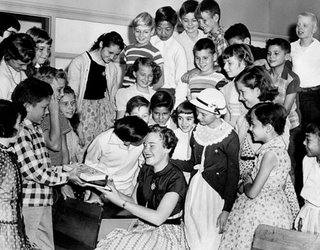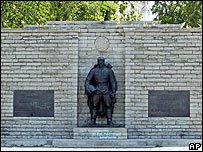
In the last week or so I have had three relatively interesting conversations about identity which I think are all related. The conversations usually stemmed from my pronouncement (proclamation?) that I am a Catholic Atheist. CA you say? What the hell is that? To be pithy: I don't believe in god but culturally I was raised Catholic and thus retain the attributes of a Papist; authoritarian, an Old Testament sense of right and wrong, a New Testament sense of justice, I like the idea of family and ritual, like shiny stained glass thingies, have lots of guilt, am a prude, etc... On the Atheist front I am truly a soft atheist or agnostic meaning I can't prove or disprove its existence but am convinced it does not exist given current evidence.
The conversations went as follows, 1) "you are not a CA because you can't be both," 2) "an Arab or Jew are White not an other" and 3) "my identity changes every day."
1) I refuted #1 using the argument put forward above, just as a Jew can claim solidarity and cultural connection with the tribe of Abraham but not believe in god then I as an Atheist can describe my reality in terms of my religious upbringing which profoundly influenced the way that I experience the world. I have a friend that I met in graduate school that was a Mormon but an atheist. He loved his family, the choir, Salt Lake, his 10 wives (kidding), the idea of mission, milk, etc... but knew that the sky god and angel Moroni (is that where moron comes from?) were bunk. He was from all appearances a member of the Latter Day Saints Church but even though they would not recognize him as a follower through and through a Mormon.
2) Whiteness, oh the blancistos. The concept is an odd one. In the modern context, it represents the scientific revolution run amok. In the US the 18th century white ruling class and particularly slave holders and expansionists used the term to mark their "racial" superiority, in other words it is socially constructed given that people are 99.999% the same genetically. They used it to justify their enslavement of millions and to displace the natives of their land.
We tend to think of "whites" as white anglo-saxon protestants in this country because at the time of early expansion most people were either from the British Isles or northern Europe. This became a major problem for the racialists and US nationalists in the late 19th century because southern Europeans started to show up by the millions and they embraced the "American way" in droves thus the major revival of the Klan which added to its list of least favored nations Papists and Jews. As the Iyetalians, Greeks, Spanairds, Poles, Russians, Slovaks, Croats and to a lesser extent Jews moved to the suburbs, became more affluent and more Republican and fully assimilated as the 20th century progressed they seemed to be able to join the ranks of whitehood as it became more and more common to see a Tanzillo, Baronian, Kanzakas or Jacersavic at the Elks, Knights of Columbus or at the local bowling league or little league game. It also became easier for them to become "white" as "others" started to show up on the shore in larger numbers after WWII in particular Latinos, Asians and South Asians.
Can Muhammad Otham or Julie Rosenberg or Julio Hernandez for that matter be "white" on an application you betcha, just as they could be other, it depends on how they experienced the United States or how their ideological perspective embraced or rejected the American Dream.
3) The third conversation occurred during a debate over why we "need" an identity anyway. I guess we don't need one but it sure helps when people ask who we are and whether we like it or not we have one. It also helps us figure out our place within our society and gives us the ability to be objective about our own reality and others reality. For me this is important for political reasons. If we understand our current time and place we can change it, within limits. We are creatures of biology, time, place our upbringing and every input that occurred during that time.
One of the statements in particular that I objected to was "my identity changes everyday." We may present ourselves to different people in different ways and like to think of ourselves as open minded and ever changing, but I would posit that we may grow and change intellectually but our basic values and primary world view is formed in our adolescents and is not fundamentally altered throughout our lives.
This is not an argument for nationalism. It's an argument for self-reflection, objective analysis and political action to alter a culture that has accepted the notion that we are what we buy.

No comments:
Post a Comment